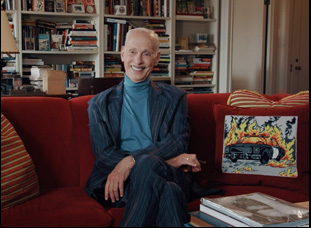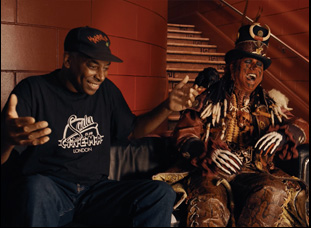“This program was very difficult for a Catholic girl,” Patricia McGrath, one of the graphic designers of the Scala Club Cinema’s monthly calendar says of her work for the famed repertory house in London, in “Scala!!! Or, the Incredibly Strange Rise and Fall of the World’s Wildest Cinema and How It Influenced a Mixed-Up Generation of Weirdos and Misfits.” McGrath could make her own art out of a lineup that might include “Eraserhead,” “King Kong” or “Pink Flamingos” on any given night and the flyers that would lure audiences to the theater were illustrated with as much creativity as the films being promoted, occasionally printed on stock that resembled a tie-dyed T-shirt. No less than John Waters tells co-directors Jane Giles and Ali Catterall in their vibrant history of London landmark that was in operation from 1978 to 1993 that it was the most insane crowds to see one of his films with and as the filmmakers reveal, those crowds were filled with artists who would go on to make their mark in a variety of different realms after being exposed to the buffet of cinematic delights the Scala always had on offer.
The grand tradition of the Scala is carried on by Giles and Catterall’s vibrant history in so many ways, sure to inspire many to race out to fill their rental queues or stop by their nearest rep house immediately when flooding the screen with exuberant clips of what was shown there, but the two can now count themselves among the many who were nudged into filmmaking by the theater after Giles, who got her start as a programmer at the Scala and subsequently went into distribution, and Catterall, who previously was a film critic for Film4, first collaborated on the book “Scala Cinema” and it became inevitable that the subject would fulfill its cinematic destiny. The Cinema Club was actually launched by Stephen Woolley, future producing partner of Neil Jordan, and subsequently could count Paul Thomas Anderson co-conspirator JoAnne Sellar as a programmer during the 1980s, but for all their fearlessness in adopting the punk rock attitude that was spreading across the local music scene for a movie theater, the film makes a convincing case that as crucial as those running the Scala were in creating an inviting environment, its audience really was completing the experience of the films even before those such as “In Fabric” director Peter Strickland and “American Psycho” director Mary Harron started making them themselves, as many recount raucous evenings at the theater.
The Scala had a few different residences before having to shut down, overwhelmed with legal costs associated with screening a banned “Clockwork Orange” twenty years after its premiere, yet the spirit of the scrappy collective carried through its entire run and now can be felt radiating off the screen and Giles and Catterall are going one step further in extending the theater’s legacy as they embark on an U.S. tour for the film, starting today in Los Angeles at the American Cinematheque’s Los Feliz 3 and heading east to New York where the Metrograph will be complimenting a theatrical run for “Scala!!!” starting Friday with a weeklong selection of films that the theater would’ve played in their heyday. Shortly before the two made the trip across the pond, they graciously took the time to talk about delivering on the three exclamation points in the title of their entertaining doc, realizing the Scala as a place where memories were truly made, and how they’re still finding things out they never knew about the place even after putting together a most comprehensive book and a film about it.

Jane Giles: Ali was a punter at the cinema in the audience when I was programming there, but we didn’t know each other at that point. I got to know Ali a bit later when he became a film critic and when I was researching the Scala book, I noticed that Ali, who by this point was a professional sub-editor, was expressing a lot of enthusiasm for the subject of the Scala. So Fab Press, my publisher, brought him on board as a sub to turn our grammatical nonsense into something readable. And then when we got the chance to adapt the book into a film, I didn’t want to do it on my own…
Ali Catterall: Yeah, as Jane says, we were both utterly obsessed with the Scala in different ways. Jane, obviously, because she virtually is the Scala, having been the programmer for three years back then, and me because, as with Jane, it never left my DNA. It got under my fingernails for various reasons. And you’ll find this a lot with people who went to the Scala. They become quite obsessive about it. But what it does take certainly to edit a book, but more so to make a movie is to be obsessive about your subject, otherwise you would not do it. So this is where we are. And Jane published her fantastic book, [which] is quite extraordinary. It is filled with every single program that the Scala ever produced and it also has an index at the back with every single film that the Scala ever showed, so you could literally time travel back and pinpoint exactly when you went to the Scala, predicated on what films there were.
Having done that, we tried initially to make a kind of sitcom, a kind of “24-Hour Party People” [type project]. And it’s still one of our major influences, but we tried that approach between 2019 and 2020, and that didn’t work and it metastasised into a [more] straightforward documentary. I say straightforward, but there’s nothing straightforward about this very punky, aesthetic documentary. And we got together with Channel X, who produce some quite fantastic dramas over in the UK, and we also took on board in our magical Scala treehouse an incredibly acclaimed British producer called Andrew Starke, who’s the guy behind most of Ben Wheatley and Peter Strickland’s movies, so we were really, really, really honored to work with him and over the next three years in lockdown — because that careened into us as well, funny enough — we somehow got it done.
Since you just mentioned Ben Wheatley and Peter Strickland, who both end up in the film as Scala patrons, the film seems to coalesce around this idea of how influential it was at giving a bunch of artists a place to be inspired. Was that a core idea from the start or something that evolved while making it?
Jane Giles: Yeah, we knew that we wanted to make a documentary from the point of view of the audience, not the management, because the management point of view would feel like a fairly traditional arts documentary. But we wanted to turn it inside out in that punk rock ethos that it was the audience who were on stage and the people on stage were in the audience. We wanted to make this film about what it felt like to be there as a young person.
In order to narrow down the many people that we could have interviewed for the film, we decided to choose a cross section of people who went on to become musicians, filmmakers, actors, comedians, and then set about going out to about 100 to 150 different names of people that we knew had been in the audience. We also tried really hard to get a good cross section of gender, of ethnicity, and of sexuality to show that the Scala was like a broad church where everybody felt welcome, so hopefully that’s represented in the interviewees that we have, which is really important because when we first had the idea to make the film, I had a number of conversations with people that went like this, “Oh, it’ll just be a load of old white guys talking about horror films,” and I’d say “There’s a certain kind of [patron] that just remembers Scala in that way, but it’s much broader than that.”

Jane Giles: Well, I’d actually left the Scala a year before it closed down, but when it finally closed because the lease ran out, I went back to help with the removals and we really thought we were going to reopen the Scala, so we kept all the programs and the ledgers with the contact information for the distributors, all sorts of bits and pieces. And I kept that chair as well and just moved it to my flat and have had it ever since. Having access to those materials gave us a kind of authenticity in addition to the sharpness of people’s memories. A lot of the people we interviewed, they can’t remember what they did yesterday, but they can remember 1983 like it was the back of their hand. So that’s where the chair came from, and when they came into the Scala, which is now a music venue as you see in the film, they heard the rumble that you can still hear, you could see the hairs standing up on their arms and the back of their necks. It’s a very, very atmospheric place still, and this really came out in what they were saying in their interviews.
You also find wonderfully creative ways to illustrate people’s remembrances — I was taken with the hand-drawn cartoons that are penciled in at the speed of the storytelling in some scenes. How did that come into the mix?
Ali Catterall: First of all, we had to be very sparing because we were making this on less than a shoestring and animation costs [a lot], even though we do have a very esteemed animator in the film called Osbert Parker, who is Quentin Tarantino’s animator, so a real kudos to him. But I approached a friend of mine who is one of the cartoonists for a Viz Comic, a very famous, Chaucerian and bawdy comic in the UK and Davey Jones drew us a fantastic frieze of the Scala audience, which we then used aspects of throughout the film. There’s something about Davey Jones’s animation that just gloriously captures something of the flavor of the Scala. He’d never been there, weirdly enough, even though he’s exactly the right age. But he somehow captured the aesthetic of the Scala through his drawing and when we couldn’t find any movie clips or any archive footage or any photographs to illustrate some of the longer stories, that’s when the commissioning of the drawing that we animated, just by the editor, just speeded it up is how we got the effect. We couldn’t be more delighted with it.
And to use [a bit of] animation was also a tribute in a way to the Scala’s eclecticism. In its very early days, the Scala was very, very keen on animation, particularly under Jane Pilling, one of the early programmers who now lectures in animation and as Jane said, we wanted to show that the Scala wasn’t just about horror movies. It did have this eclecticism of programming, and animation is certainly up there.
Even after your own experience at the Scala and working on the book, were there still stories that were new to you as you were making the film?
Jane Giles: Yeah, I knew I had a few voices when I wrote the book. A small number of people like Peter Strickland, Ben Wheatley, the kind of hardcore [patrons], but in the years developing it, I met more and more and more people and we started just going out there at random, looking at the age of filmmakers, not just BBC filmmakers, but sometimes other people. For example, we’d be at the London Film Festival and we’d see Danny Boyle sitting at the bar and I’d say to Ali, “Go and ask him,” and because he’s much bolder than me, he would go and ask people if they were ever there. This process is still continuing. There were names that we didn’t capture for our list of names at the end, like Jonathan Glazer and Sam Taylor-Johnson. And the more the film becomes known, people tend to reference it, so one thing that we learned was how many more people went there. We heard stories from people that we didn’t know.
Ali Catterall: The electrocution story Jane found out on the launch of her book. Someone said that night, “Yeah, I went to the Scala. I was in a band and I got electrocuted live on stage, nearly died.” So weirdly enough, we didn’t interview that guy in person, but we interviewed Mark Moore, who was in the audience about that very gig and he remembers it very well. So it was just a process of gathering these stories and thinking, when it comes to the Scala, it’s all stranger than fiction. There are so many stories wrapped up in that building because for one thing, it was there for quite a while and so many extreme kinds of people went there, so it naturally lends itself to those kind of stories.
Jane Giles: The other thing that we didn’t quite realize when the book was written and really came out in the process of the filmmaking was how emotional it was for people. We had quite a few tears while the interviews were being shot. Our producer and lead editor Andy Starke is a very sensitive man and he had a really great feeling for the streak of melancholy that runs through it, which I think is not just about nostalgia, but that Joni Mitchell, “You don’t know what you’ve got till it’s gone”-type feeling that is not just about the Scala, but it’s universal. And we’ve really found that with audiences as well who’ve been quite moved by it, even though they are far too young to have ever heard of the Scala, let alone to have been there.
Ali Catterall: Yeah, the most constant comment we get is I’ve got nostalgia or FOMO for a place I never went to, which is fantastic.
“Scala!!!” will have a series of special screenings in the U.S. starting on July 18th in Los Angeles at the Los Feliz 3 at 7 pm and July 19th at the Frida Cinema in Orange County and start a weeklong run in New York on July 19th at the Metrograph in New York, with special screenings on July 21st and 23rd of the film as part of the larger series “Long Live Scala Cinema!”




